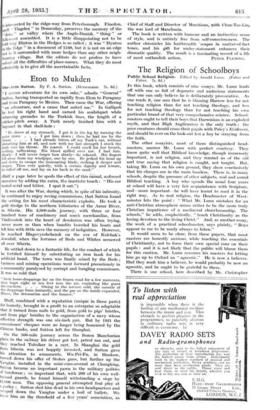Eton to Mukden
One-Arm Sutton. By F. A. Sutton. (Heinemann. 7s. 6d.) "1 LOVED adventure for its own sake," admits "General" Sutton, having transported us rapidly from Eton to Paraguay and from Paraguay to Mexico. Then came the War, offering " an adventure; and a cause that suited me." In Gallipoli he lost his right hand and earned his soubriquet while returning grenades to the Turkish lines, the length of a cricket-pitch away. A Turk nearly finished him with a bayonet in that shell-hole : "He drove at my stomach. I got it in the leg by turning the point down . . . I got him down ; then he had me by the throat . . . I had already bitten off my Turk's ear, without disturbing him at all, and now with my last strength I stuck the knife into his throat. He roared. I could smell his hot breath, reeking, suffocating. His blood spilled over me. I had him. slowly—I will never forget how slowly—ho relaxed. His fingers fell away from my windpipe, one by one. He jerked his head up and down to escape the insinuating blade, striking it deeper and deeper. Then very quietly, with a certain dignity and leisure, he rolled off me, and lay on his back in the sand."
(Half a page later he spoils the effect of this Qual, unforced narrative by adding the extra, the inartistic touch : " His ear tasted acrid and bitter. I spat it out.") It was after the War, during which, in spite of his infirmity, he continued to enjoy roving commissions, that Sutton found the setting for his most characteristic exploits. He took a gold dredge to the northern tributaries of the Amur River, in. Siberia. His 2,000-mile journey, with .three or four hundred tons of machinery and much merchandise, frOm Vladivostok into the heart of desolation was often trying, never more so than when bandits boarded his boats and left him with little save the memory of indignities. However, he reached Blagovyeshchensk on the eve of Kolchak's downfall, when the fortunes of Reds and Whites seesawed all over Siberia.
He settled down to a fantastic life, for the conduct of which he fortified. himself by substituting an iron hook for his artificial hand. The town was finally seized by the Reds ; business and mining operations went forward precariously in a community paralysed by corrupt and bungling commissars. It was so cold that
" fresh horse-droppings lay on the frozen road for a few moments, then leapt eight or ten feet into the air, exploding like giant fire-crackers. . . Owing to the intense cold, the outside of the droppings frtizo instantly, and the gas on the inside expanded. Hence, the detonation and the bounce."
Bluff, combined with a reputation (unique in those parts) for honesty, brought in a profit to an enterprise so adaptable that it turned from nails to gold, from gold to pigs' bristles, and from pigs' bristles to the organization of a navy whose effective strength was one six-inch guh. But by 1921 the commissars' cheques were no longer being honoured by the Chinese banks, and Sutton left for Shanghai.
On the 500-mile journey across the frozen Manchurian plain to the railway his driver got lost, petrol ran out, and they reached Tsitsihar in a cart. In Shanghai the gold from Siberia was not happily invested, and Sutton gave his attention to armaments. Wu-Pei:Fu, in Hankow, turned down his offer of Stokes guns, but further up the Yangtze, installed in the mint-cum-arsenal at Chungking, Sutton became an important pawn in the military politics of Szechwan ; so important that, with 200 of his own well- trained guards, he foimd hirnself withstanding a siege by 15,000 men. The, opposing general attempted foul play at a parley ; Sutton shot him dead in his own headquarters and escaped down the Yangtze - under a hail of 'bullets. We leave him on the threshold of a five years' association, as
Chief of Staff and Director of Munitions, yeith Chan-Tso-Lin, the war lord of Manchuria.
The book is written with humour and an instinctive sense of style, and is entirely free from self-consciousness. The author chronicles his hairbreadth 'stapes in matter-of-fact tones, and his gift for under-statement enhances their dramatic quality. The result is a fascinating record of a life






































 Previous page
Previous page